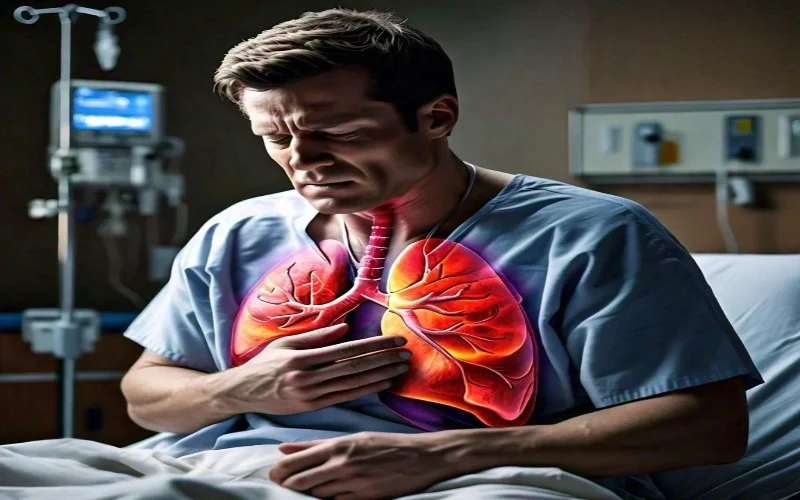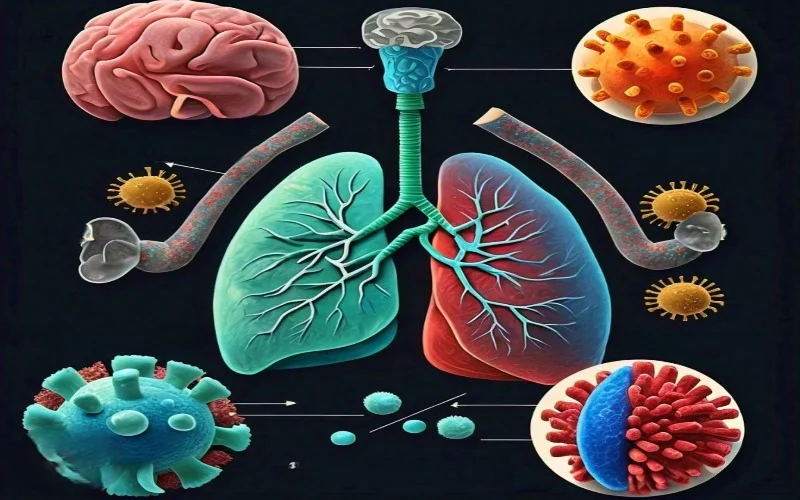Pneumonia is a major public Health issue globally where millions of people all over the world become victims of this disease every year. Pneumonia is basically the type of lung infection that can be smaller or complicated. Remember in some of the cases this infectious disease can be fatal and even lead to death as well. That’s why it is really important to understand its symptoms for moving towards the journey of its management. In this comprehensive article you will be in a position to know about its causes and comprehensive treatment options. So this overall article gives you complete understanding about pneumonia. Let’s get started.
What is Pneumonia?
Pneumonia is that type of disease that creates inflammation of the air sacs in either one or both of the lungs. Now try to understand where the problem arises. These air sacs, we can call them as airways when filled up with fluid or pus, the issues starts to build up such as cough and fever, chills and difficulty in breathing. The major culprits behind this condition are mostly bacteria, viruses and fungus. It is important to understand that pneumonia has the ability to affect people of any age. It is really dangerous for newborn babies, young children and old people. Besides that, those people who have weak immune systems are at higher risk of developing symptoms of pneumonia.

Symptoms
It is very important to know that every individual has different symptoms of pneumonia due to the intensity of the infection. Besides that, age and general health also matters in this case. Here in this part of the article we are going to talk about some of the common symptoms that is actually the basic step towards batter treatment. Let’s have a look.
Cough
If someone is experiencing chronic persistent cough that is creating yellow, green or red mucus, it may be the sign of pneumonia.
Fever
Fever is actually a basic sign in most of the diseases and the same is the case here. If an affected person is suffering from high temperature with chills and sweating then try to go to your healthcare provider and discuss your symptoms with him for effective diagnosis.
Difficulty in Breathing
A person can face difficulty while breathing. The difficulty in breathing means shortness of breath and quick deep breathing.

Chest pain
Chest pain is another common symptom in case of pneumonia. An affected person can experience a severe and throbbing chest pain that starts to increase with deep breathing or coughing.
Fatigue
A person mostly experiences feelings of tiredness and weakness.
Confusion
In most of the cases it is observed that the feeling of confusion arises especially in older people that indicate the possibility of pneumonia. A person can observe changes in the perception in this case.
Nausea and Vomiting
If someone, especially a youngster is suffering from pneumonia, the symptoms of nausea and vomiting are mostly common.
Causes
There are a variety of different microorganisms that are the major contributing factors in case of pneumonia. Most common causes of pneumonia are as follows.

Bacterial Pneumonia
Streptococcus pneumoniae is a special type of bacteria that creates bacterial pneumonia in most of the cases. Besides that, there are some other bacteria that can also cause pneumonia including haemophilus influenzae, mycoplasma pneumoniae and legionella pneumophila.
Viral Pneumonia
As the name suggests viral pneumonia is created due to the virus. There are different types of viruses that are the major contributing factors towards pneumonia including influenza flu, respiratory syncytial virus and last but not the least is the coronaviruses where COVID 19 virus is also included.
Fungal Pneumonia
Fungal pneumonia is caused by fungus. Fungi mostly found in soil or the droppings of birds are considered to create pneumonia. Research has shown that those people who have weak immune systems are at a higher level of risk to develop the symptoms of fungal pneumonia. Common examples of it are histoplasma, coccidioides and cryptococcus.
Risk Factors
There are some risk factors that can lead to pneumonia. In this part of the article our main focus is to discuss some of the important risk factors. Let’s have a look.
Age
Age factor is very important when we talk about pneumonia. It is important to note that young children who are under 2 years and old people whose ages are 65 or above are at higher levels of risks as compared to others in case of pneumonia.
Chronic Diseases
Those diseases that go long term or chronic disease can also lead people to pneumonia. Some fatal diseases like chronic obstructive pulmonary disease, asthma and heart diseases are considered to increase the risk of developing pneumonia.
Weak Immune System
Remember your immune system actually decides how powerful you are in order to avoid diseases. The weak immune system of your body cannot defend you against diseases. Due to the weak immune system diseases like HIV/AIDS, organ transplant or cancer therapies are more likely to suffer from pneumonia.

Smoking
Smoking is really dangerous not for this case but for your overall health. Due to smoking your lungs are damaged and also the ability of your body to fight against infection decreases to a great extent.
Hospitalization
If you stay in the hospital due to some medical treatment in the critical care unit, the chances of developing pneumonia increases, especially if you are on a breathing machine which is called a ventilator.
Diagnosing Pneumonia
It is very important to diagnose pneumonia in order to go for better treatment options. There are actually three things that you have to do in case of diagnosis. There is a need to check out medical history, physical examination and take diagnostic tests for comprehensive diagnosis. Let’s talk about it in detail.

Physical Examination
Physical examination is the basic step in order to check out the possible abnormalities regarding pneumonia. Doctors usually used a stethoscope for listening to abnormal sounds to the lungs like bubbling or cracking. This can give an idea about the possibility of pneumonia.
Chest X-ray
Imaging examination is really crucial to see the size and location of the infection within the lungs.
Blood Tests
Blood tests are equally important to diagnose any type of disease and the same is the case here. These tests help to verify the presence of any infection and play their part to identify those types of microorganisms that cause pneumonia.
Sputum Test
In this test the sample of saliva or mucus is taken from an infected person in order to check out the actual cause of the infection.
Pulse Oximetry
In pulse oximetry tests, the amount of oxygen in the blood is determined in order to check out whether the lungs are working smoothly or not.
Treatment of Pneumonia
This is actually a very important part of the article where you can get complete information on how you can go about treating pneumonia in an effective way. Remember its treatment actually depends on various factors such as how complicated the disease is and what its type. So in the following there are some important treatment options for you in case of pneumonia.

Antibiotics
As we have said earlier in this comprehensive article that there are certain factors that cause pneumonia so in case of bacterial pneumonia, antibiotics play their part to reduce symptoms to a greater extent. But the important thing at the moment is when you start taking antibiotics. It is important to go till the end of a procedure. Try to finish the course even if the symptoms get better before the recommended period.
Antiviral Medicines
As the name suggests, in case of viral pneumonia there is a need to take antiviral medicine. Antiviral medicines are highly recommended for treating influenza or COVID-19.
Antifungal Medicines
Antifungal medicines are recommended for treating fungal pneumonia.
Non Prescription Medicines
You can take over the counter or non-prescription medicine in case of fever and pain. Certain medicines like acetaminophen and Ibuprofen are really helpful in these situations.
Rest and Fluids
In order to boost up the recovery process of your body there is a need to take enough rest and sleep. Besides that, focus on your hydration as well. Drink plenty of water regularly to support your body to perform its functions normally.
Hospitalization
It becomes important to be hospitalized when the symptoms become severe and the situation slips out of control. During hospitalization various treatment options are applied such as oxygen therapy, respiratory therapies and intravenous antibiotics.
Prevention
As we know that prevention is better than cure. So you must give attention in order to prevent pneumonia in a better way. Here in the following we are going to talk about some of the important preventive methods that you can apply and can get results. Let’s have a look.

Vaccination
The first step in preventing pneumonia is to take vaccination. There are some vaccines which are available in order to prevent certain types of pneumonia and some related diseases as well. The most important vaccines that are available in this case are pneumococcal vaccine, COVID-19 vaccine and flu vaccine.
Good Hygiene
In case of pneumonia as it is an infectious disease, try to maintain good hygiene. For this purpose wash your hands regularly and cover your mouth and nose before sneezing and coughing. It will help to avoid the transmission of infections.
Healthy Lifestyle
Healthy lifestyle is a broad term which means live your life in a moderate way. Eat a balanced diet full of Nutrition and vitamins. Try to make a habit to exercise regularly on a daily basis. It is better to avoid and remove smoking or quit drinking alcohol from your life if you want to live a happier life. By doing this your immune system will become powerful and that is a positive sign for your overall health.
Avoid contacting with Sick People
It is important to reduce your contact especially with those people who are already suffering from any type of disease. In most cases it is recommended during flu season. By doing this, risk factors of developing infection reduce to a greater extent.
Regular Medical Checkups
Try to go to your professional healthcare provider for regular checkups. It is important in order to discover and manage serious medical issues that can increase the chances of pneumonia.
Conclusion
Pneumonia is a serious lung infection that needs immediate diagnosis and effective treatment. In order to manage pneumonia in a meaningful way there is a need to first understand its symptoms and causes. Besides that, it is very important to take preventive measures in order to tackle this infectious disease. Vaccination and maintaining good hygiene can play their part for treating and reducing the risk factors of pneumonia. So if you or anyone you love is suffering from pneumonia, it is important to give them complete guidance about this infectious disease. Visit your doctor immediately if symptoms are severe or unmanageable.
